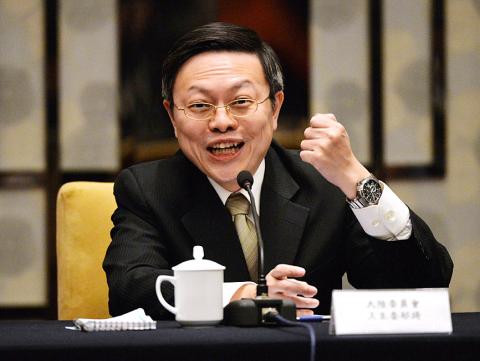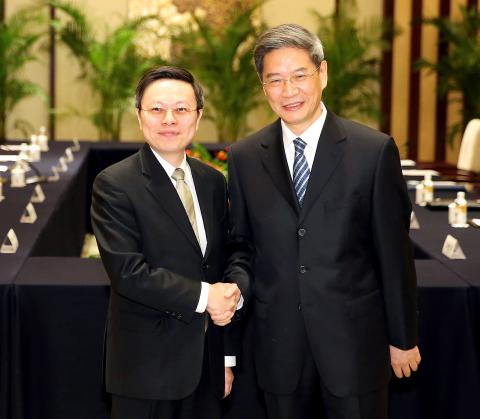Taiwanese and Chinese officials yesterday held the first direct and the highest-level talks since 1949, when the Chinese Nationalist Party (KMT) fled to Taiwan following its defeat by the Chinese Communist Party in the Chinese Civil War.
The historic meeting between Mainland Affairs Council (MAC) Minister Wang Yu-chi (王郁琦) and his counterpart, Taiwan Affairs Office (TAO) Minister Zhang Zhijun (張志軍), in the Chinese city of Nanjing, which agreed to establish a communication channel for future engagement, marked the first time in 65 years that government ministers from across the Taiwan Strait had held talks in their official capacities, despite more than a dozen agreements having been signed during President Ma Ying-jeou’s (馬英九) two terms in office.
Wang, who led a 20-member delegation on a four-day visit to China, told a press conference after a three-hour closed-door meeting at the Purple Palace Nanjing Hotel that his ministry and the TAO had agreed to establish a direct and regular communication platform and reached a consensus in principle on several issues.

Photo: AFP
The communication channel would go hand-in-hand with the current semi-governmental mechanism between the Straits Exchange Foundation (SEF) and the Association of Relations Across the Straits (ARATS), as they are complementary rather than adversarial, Wang said.
The issue of a potential meeting between Ma and Chinese President Xi Jinping (習近平) at an APEC summit in Beijing later this year, which has drawn suspicion from the opposition parties in Taiwan, was not raised at the meeting, nor was the sensitive topic of China’s demarcation of an East China Sea air defense identification zone, Wang said.
The minister said that he had “no regrets” about not discussing the potential Ma-Xi meeting because “it was not on the agenda in the first place.”

Photo: CNA
The Legislative Yuan had put Wang on a tight leash by passing a resolution prohibiting the minister from signing any written document during his visit.
The first highlight of the meeting came before the talks started as hundreds of reporters tried to anticipate how the officials would address each other, a barometer for a breakthrough in bilateral relations.
Wang referred to Zhang as “TAO Minister Zhang Zhijun,” while Zhang simply addressed Wang as “Minister Wang Yu-chi,” leaving out the name of Wang’s ministry, before the two shook hands and made their opening statements.
However, China’s state-owned Xinhua news agency referred to Wang as the “responsible official of Taiwan’s Mainland Affairs Council” in its Chinese-language reports and as “Taiwan’s mainland affairs chief” in its English-language coverage.
Both officials reiterated in their statements that the so-called “1992 consensus” serves as the foundation of bilateral engagement, which would be strengthened under the current framework in the future.
“It’s not been easy for us to be sitting at the same table today,” Wang said.
At the meeting, they agreed to seek a solution on health insurance coverage for Taiwanese students studying in China, pragmatically plan for the establishments of SEF and ARATS offices in each other’s territory and study the feasibility of allowing humanitarian visits to detained nationals once the offices have been established.
Taiwan raised the issue of reciprocal exchange of news information, but did not protest China’s refusal to issue visas to two Taiwanese reporters who wished to travel to cover the visit.
Wang also brought up Taiwan’s hope for parallel progress between economic integration with China and the rest of the world, without receiving a positive response from the Chinese side.
In his opening statement, Zhang said cross-strait relations “cannot afford to suffer from another decline” after they have dramatically improved since May 2008 — when Ma took office.
A Xinhua report said the meeting has reached “positive consensus” on many fronts, including an insistence on the “1992 consensus,” opposition to independence for Taiwan and strengthening exchanges.
The report urged follow-up agreements under the Economic Cooperation Framework Agreement (ECFA) and to study the feasibility of bilateral cooperation on regional economic integration.
Zhang also accepted Wang’s invitation for a return visit, it said.
Wang is scheduled to visit the Sun Yat-sen Mausoleum today, before delivering a speech at Nanjing University on youth exchanges across the Taiwan Strait.
He is due to attend a forum and hold talks with Chinese think tanks tomorrow, before wrapping up the trip and returning to Taipei on Friday.

NATIONAL SECURITY THREAT: An official said that Guan Guan’s comments had gone beyond the threshold of free speech, as she advocated for the destruction of the ROC China-born media influencer Guan Guan’s (關關) residency permit has been revoked for repeatedly posting pro-China content that threatens national security, the National Immigration Agency said yesterday. Guan Guan has said many controversial things in her videos posted to Douyin (抖音), including “the red flag will soon be painted all over Taiwan” and “Taiwan is an inseparable part of China,” while expressing hope for expedited “reunification.” The agency received multiple reports alleging that Guan Guan had advocated for armed reunification last year. After investigating, the agency last month issued a notice requiring her to appear and account for her actions. Guan Guan appeared as required,

A strong cold air mass is expected to arrive tonight, bringing a change in weather and a drop in temperature, the Central Weather Administration (CWA) said. The coldest time would be early on Thursday morning, with temperatures in some areas dipping as low as 8°C, it said. Daytime highs yesterday were 22°C to 24°C in northern and eastern Taiwan, and about 25°C to 28°C in the central and southern regions, it said. However, nighttime lows would dip to about 15°C to 16°C in central and northern Taiwan as well as the northeast, and 17°C to 19°C elsewhere, it said. Tropical Storm Nokaen, currently

PAPERS, PLEASE: The gang exploited the high value of the passports, selling them at inflated prices to Chinese buyers, who would treat them as ‘invisibility cloaks’ The Yilan District Court has handed four members of a syndicate prison terms ranging from one year and two months to two years and two months for their involvement in a scheme to purchase Taiwanese passports and resell them abroad at a massive markup. A Chinese human smuggling syndicate purchased Taiwanese passports through local criminal networks, exploiting the passports’ visa-free travel privileges to turn a profit of more than 20 times the original price, the court said. Such criminal organizations enable people to impersonate Taiwanese when entering and exiting Taiwan and other countries, undermining social order and the credibility of the nation’s

‘SALAMI-SLICING’: Beijing’s ‘gray zone’ tactics around the Pratas Islands have been slowly intensifying, with the PLA testing Taiwan’s responses and limits, an expert said The Ministry of National Defense yesterday condemned an intrusion by a Chinese drone into the airspace of the Pratas Islands (Dongsha Islands, 東沙群島) as a serious disruption of regional peace. The ministry said it detected the Chinese surveillance and reconnaissance drone entering the southwestern parts of Taiwan’s air defense identification zone early yesterday, and it approached the Pratas Islands at 5:41am. The ministry said it immediately notified the garrison stationed in the area to enhance aerial surveillance and alert levels, and the drone was detected in the islands’ territorial airspace at 5:44am, maintaining an altitude outside the effective range of air-defense weaponry. Following